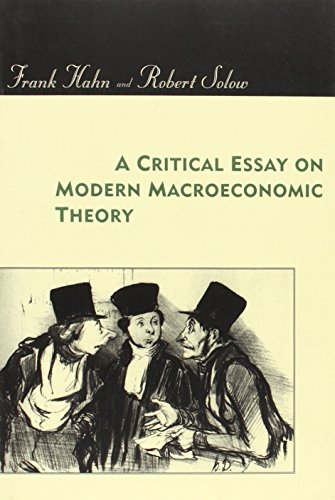Verwandte Artikel zu Critical Essay on Modern Macroeconomic Theory (Mit...

Inhaltsangabe
Macroeconomics began as the study of large-scale economic pathologies such as prolonged depression, mass unemployment, and persistent inflation. In the early 1980s, rational expectations and new classical economics dominated macroeconomic theory, with the result that such pathologies can hardly be discussed within the vocabulary of the theory. This essay evolved from the authors' profound disagreement with that trend. It demonstrates not only how the new classical view got macroeconomics wrong, but alsohow to go about doing macroeconomics the right way. Hahn and Solow argue that what was originally offered as a normative model based on perfect foresight and universal perfect competition—useful for predicting what an ideal, omniscient planner should do—has been almost casually transformed into a model for interpreting real macroeconomic behavior, leading to Panglossian economics that does not reflect actual experience. Following an explanation of microeconomic foundations, chapters introduce the basic elements for a better macro model. The model is simple, but combined with the appropriate model of the labor market it can say useful things about the fluctuation of employment, the correlation between wages and employment, and the role for corrective monetary policy.
Die Inhaltsangabe kann sich auf eine andere Ausgabe dieses Titels beziehen.
Über die Autorinnen und Autoren
Frank Hahn, one of Britain's most eminent economists, is Professor of Economics at Cambridge University and author of Equilibrium and Macroeconomics (MIT Press 1985).
Robert M. Solow is Institute Professor of Economics.
Von der hinteren Coverseite
Macroeconomics began as the study of large-scale economic pathologies such as prolonged depression, mass unemployment, and persistent inflation. In the early 1980s, rational expectations and new classical economics dominated macroeconomic theory, with the result that such pathologies can hardly be discussed within the vocabulary of the theory. This essay evolved from the authors' profound disagreement with that trend. It demonstrates not only how the new classical view got macroeconomics wrong, but also how to go about doing macroeconomics the right way. Hahn and Solow argue that what was originally offered as a normative model based on perfect foresight and universal perfect competition - useful for predicting what an ideal, omniscient planner should do - has been almost casually transformed into a model for interpreting real macroeconomic behavior, leading to Panglossian economics that does not reflect actual experience. Following an explanation of microeconomic foundations, chapters introduce the basic elements for a better macro model. The model is simple, but combined with the appropriate model of the labor market it can say useful things about the fluctuation of employment, the correlation between wages and employment, and the role for corrective monetary policy.
„Über diesen Titel“ kann sich auf eine andere Ausgabe dieses Titels beziehen.
EUR 15,06 für den Versand von USA nach Deutschland
Versandziele, Kosten & DauerSuchergebnisse für Critical Essay on Modern Macroeconomic Theory (Mit...
Critical Essay on Modern Macroeconomic Theory (Mit Press)
Anbieter: Powell's Bookstores Chicago, ABAA, Chicago, IL, USA
Zustand: Used - Like New. 1997. Reprint. paperback. Publisher's mark on text block. Otherwise, Fine. Artikel-Nr. DR001468
Anzahl: 1 verfügbar
A Critical Essay on Modern Macroeconomic Theory
Anbieter: Wonder Book, Frederick, MD, USA
Zustand: Good. Good condition. A copy that has been read but remains intact. May contain markings such as bookplates, stamps, limited notes and highlighting, or a few light stains. Artikel-Nr. G02A-02539
Anzahl: 1 verfügbar

